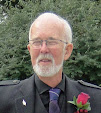"It's how you tell them that matters." That's what is said about jokes, I believe. So entitling this post "In Search of Cures" sets minds off on a particular train of thought rather than if I'd said, for example, "In Praise of Drug Companies" which would almost certainly have elicited instant critical debate.
I've just spent three days in Glasgow: Monday and Tuesday having CT/MRI scans and a bone scan and Wednesday having my 16-weekly Drug Trial Review. All funded by drug companies and, in part, by cancer charities.
I don't know how many medical trials there are going on in the world at any one time but it is probably thousands and, of those, the majority will probably involve drugs and, therefore, drug companies.
I am a participant in a trial for a drug specific to the cure and/or prevention of prostate cancer: a cancer for which I was first operated on 20 years ago and for which I have been receiving treatment ever since. I understand that the trial runs for 6 years. I don't know how many countries are taking part but there are a lot of languages on the medicine literature.
The Trial is a 67:33 double-blind trial. A blind or blinded-experiment is an experiment in which information about the test is masked (kept) from the participant, to reduce or eliminate bias, until after a trial outcome is known. It is understood that bias may be intentional or subconscious, thus no dishonesty is implied by blinding. If both tester and subject are blinded, the trial is called a double-blind experiment. The 66:33 means that 67% of the participants get the real drug and 33% get the placebo.
All this is done to satisfy the drug company that the drug is efficacious. If it is then the results will be used to convince the powers that be in the countries throughout the world to licence the drug for general use.
I have absolutely no idea how many scientists and researchers it takes to produce any particular drug nor what a trial and, if successful, subsequent licensing costs. Back in 2013 in a BBC article it was said that patents are generally awarded for 20 years but 10-12 of those years are typically spent developing the drug at a cost of about $1.5bn-$2.5bn. The remaining years are used to make the profit before the drug is made by generic manufacturers. However lots of drugs never get past the trial stage and only a very small number of drugs are 'super-earners'.
I have little doubt that there is much for which to criticise drug companies but I shall leave that to others.
As a beneficiary of their drugs in general and of this particular trial in particular I have to say that I'm not feeling in a critical mood.
The Trial is a 67:33 double-blind trial. A blind or blinded-experiment is an experiment in which information about the test is masked (kept) from the participant, to reduce or eliminate bias, until after a trial outcome is known. It is understood that bias may be intentional or subconscious, thus no dishonesty is implied by blinding. If both tester and subject are blinded, the trial is called a double-blind experiment. The 66:33 means that 67% of the participants get the real drug and 33% get the placebo.
All this is done to satisfy the drug company that the drug is efficacious. If it is then the results will be used to convince the powers that be in the countries throughout the world to licence the drug for general use.
I have absolutely no idea how many scientists and researchers it takes to produce any particular drug nor what a trial and, if successful, subsequent licensing costs. Back in 2013 in a BBC article it was said that patents are generally awarded for 20 years but 10-12 of those years are typically spent developing the drug at a cost of about $1.5bn-$2.5bn. The remaining years are used to make the profit before the drug is made by generic manufacturers. However lots of drugs never get past the trial stage and only a very small number of drugs are 'super-earners'.
I have little doubt that there is much for which to criticise drug companies but I shall leave that to others.
As a beneficiary of their drugs in general and of this particular trial in particular I have to say that I'm not feeling in a critical mood.



